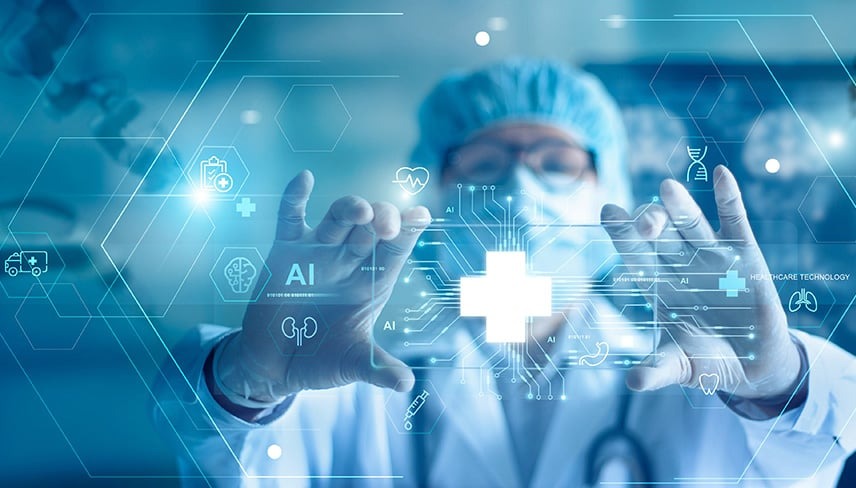Artificial Intelligence (AI) is revolutionizing healthcare, transforming patient care, diagnosis, treatment, and medical research. From detecting diseases early to personalizing treatments and streamlining hospital operations, AI is playing a crucial role in saving lives. With its ability to analyze massive datasets, AI enhances efficiency, reduces errors, and supports healthcare professionals in making better decisions.
1. AI in Disease Diagnosis 🏥🔬
AI-powered tools are improving disease detection and diagnosis with unprecedented accuracy.
🔍 Early Detection of Diseases
AI algorithms analyze medical imaging, blood tests, and genetic data to detect diseases at an early stage. Examples include:
- Cancer Detection 🎗️: AI analyzes mammograms and CT scans to identify early signs of breast, lung, and skin cancer with high accuracy.
- Cardiovascular Diseases ❤️: AI predicts heart disease risks by analyzing ECGs, cholesterol levels, and patient history.
- Diabetes Management 🩸: AI monitors blood sugar levels and predicts diabetic complications.
🧠 AI in Medical Imaging
AI enhances radiology by quickly analyzing X-rays, MRIs, and CT scans, reducing the workload for radiologists and minimizing human error.
Example: Google’s DeepMind AI can detect eye diseases like diabetic retinopathy from retinal scans with over 90% accuracy.
2. AI in Personalized Treatment & Drug Discovery 💊⚡
AI is enabling precision medicine, where treatments are tailored to individual patients based on genetics, lifestyle, and health conditions.
🔬 AI in Drug Discovery
AI speeds up drug development by analyzing molecular structures and predicting how new drugs will interact with diseases.
- Example: AI helped develop COVID-19 vaccines faster by analyzing virus mutations and predicting effective formulations.
- AI reduces drug discovery time from years to months, saving billions in research costs.
🧬 Genomics & AI
AI deciphers genetic information to predict disease risks and suggest personalized treatments.
- Example: AI-powered tools like IBM Watson analyze a patient’s DNA to recommend customized cancer treatments.
3. AI in Surgery & Robotic Assistance 🤖🔪
AI is enhancing surgical precision through robotic-assisted surgeries and real-time decision-making.
🦾 AI-Powered Surgical Robots
- Da Vinci Surgical System 🎯: Assists surgeons in performing minimally invasive procedures with high precision.
- Augmented Reality (AR) in Surgery 🕶️: AI overlays important information (like blood vessels and tumors) onto a surgeon’s field of view.
🏥 AI in Emergency Rooms
AI prioritizes critical patients in emergency rooms by analyzing symptoms and predicting severity, ensuring faster treatment for life-threatening cases.
4. AI in Virtual Healthcare & Telemedicine 📱💬
Telemedicine powered by AI is revolutionizing healthcare by making medical services accessible remotely.
🤖 AI Chatbots & Virtual Assistants
AI-driven chatbots like Babylon Health and Ada Health help diagnose common illnesses and provide medical advice.
- Benefits:
✅ Reduces the burden on doctors.
✅ Provides 24/7 medical assistance.
✅ Helps in mental health support through AI therapy bots like Woebot.
🩺 Remote Patient Monitoring
Wearable AI devices like Apple Watch and Fitbit track heart rate, oxygen levels, and activity, alerting doctors to early signs of health issues.
Example: AI detected COVID-19 symptoms in smartwatch users before they experienced symptoms.
5. AI in Hospital Management & Workflow Optimization 🏥📊
Hospitals are using AI to improve efficiency, reduce wait times, and enhance patient care.
📅 AI in Scheduling & Patient Flow Management
AI predicts patient admissions, manages hospital beds, and optimizes doctor schedules to reduce overcrowding.
📦 AI in Medical Supply Chain Management
AI ensures hospitals never run out of essential medicines and equipment by forecasting demand and managing inventory.
Example: During the COVID-19 pandemic, AI helped predict ventilator shortages and optimized distribution.
6. AI in Mental Health Care 🧠💙
AI is making mental health support more accessible through smart chatbots and predictive analytics.
💬 AI Therapy & Support
AI-driven mental health chatbots like Woebot and Wysa provide emotional support, coping strategies, and therapy sessions.
📊 Predicting Mental Health Crises
AI analyzes social media activity, speech patterns, and wearable device data to detect early signs of depression, anxiety, or suicidal thoughts.
Example: AI flagged suicidal risks in social media posts, enabling timely intervention and saving lives.
7. AI in Infectious Disease Outbreak Prediction 🌍🦠
AI helps in predicting and controlling disease outbreaks by analyzing global health data.
🌡️ AI in Epidemic Forecasting
AI models track disease spread, helping governments prepare for pandemics.
- Example: AI company BlueDot detected COVID-19 outbreak before WHO by analyzing news and airline data.
🚑 AI in Public Health Monitoring
AI analyzes patient symptoms worldwide to detect emerging health threats like flu outbreaks, Ebola, and new variants of viruses.
Challenges of AI in Healthcare ⚠️🤯
Despite its benefits, AI in healthcare faces several challenges:
❌ Data Privacy & Security – Sensitive medical data must be protected from cyber threats.
❌ Bias in AI Models – AI can reflect biases in training data, leading to incorrect diagnoses for some populations.
❌ High Implementation Costs – AI technology requires significant investment in infrastructure and training.
❌ Lack of Human Touch – AI cannot replace the empathy and intuition of human doctors.
The Future of AI in Healthcare 🚀🔮
The future of AI in healthcare is promising, with advancements in:
- AI-powered prosthetics for disabled individuals.
- Nanorobots for targeted drug delivery inside the body.
- AI-driven disease prediction before symptoms appear.
- Fully autonomous AI surgeons for complex procedures.
AI will continue to evolve, improving global healthcare access, reducing costs, and saving millions of lives.
Conclusion 🏆💡
AI is transforming healthcare by enhancing diagnosis, treatment, surgery, mental health care, and hospital management. From detecting diseases early to predicting pandemics, AI is making healthcare faster, smarter, and more efficient. While challenges remain, AI’s potential to save lives and improve medical care is limitless.


